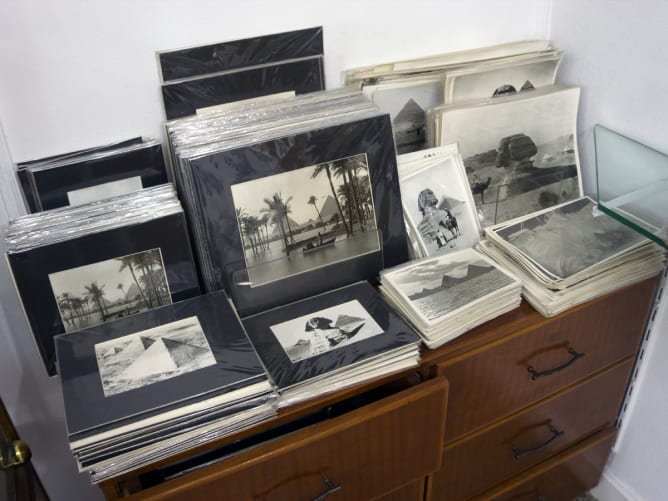The Treasure in Black and White – 100 Years Lehnert & Landrock
The photo archive of «Lehnert & landrock» which contains more than 6000 pictures is over 125 years old; a true treasure. The photographs are so famous that they shaped the Western view on the Arab World. And the story is so extensive that it reflects the history of Egypt in it. Whatever happened in a 100 years that this cultural institution had to reduce its activity. The Swiss book and photography shop «Lehnert & Landrock» was once very successful. Today the shop is fighting ongoing crisis and decreasing number of tourists in Cairo. If the situation in Cairo does not change the shop in the heart of city will not be able to keep its cultural heritage alive. 2017 might be the last year in the history of «Lehnert & Landrock». We want to accompany the shop through the year and hold on to the stories and images in a documentary. Help us to keep moments of the past alive and document a different view of the Arab World. The best thing: Backing the documentary «The Treasure in Black and White – 100 Years Lehnert and Landrock» gives you the unique opportunity to get your original print of the legendary «Lehnert & Landrock» collection! The current manager Dr. Edouard Lambelet supports the film project. He made the photographs available for the crowdfunding. «My biggest wish is for the tradition to keep alive in any possible way.»
The Artist and the Businessman
The story begins in 1904. The photographer Lehnert and the businessman Landrock go on the odyssey of searching for the image of the «Orient». «We could start a business with your pictures» said Landrock to Lehnert. The Western love for exoticism, fairytales and mystery was their way to success. Although today the region is best known for unrest and terror it used to be the place of wishfulness and economic perspectives. In 1904 they establish a photo studio in Tunis. Many in Europe soon admire their staged photographs, nudes, portraits and landscapes. Some of their images travel the world. They have a significant role in shaping the Western idea of the authentic life in the Orient. Their motives were even used on the Egyptian currency.
After various difficulties caused by the First World War the two men decide to settle in the liberal Cairo. Before the outbreak of the Second World War Landrock transfers 80% of the share to his Swiss step-son Kurt Lambelet. This move turns out to be a savior. All the German businesses are confiscated. Given the fact that the shop lies in Swiss hands they are able to continue their legacy. Following the coup of 1952 «Lehnert and Landrocks» future is again uncertain. The initial euphoria quickly dies. The new government preaches nationalism and anti-imperialism. They begin nationalizing all the foreign businesses. «Lehnert and Landrock» is also on their list. But after they nationalize the Suez Canal – that was still controlled by Britain – the war breaks out. The attack on Egypt sets new priorities for the government. Nevertheless the hatred towards the West clearly increases. Although most of the foreigners leave the country Kurt Lamdelet against all odds decides to stay.
A Treasure of «Negativ» – Glass Palettes
The persistence of Kurt Lambelet pays off soon. The shop is not nationalized but in the contrary he is able to open a new branch in the Egyptian Museum. Now is the time for his son Edouard Lambelet to help. One day the young Lambelet discovers dusty boxes filled with old film negatives. «What is that» he asks his father. «Those are old photographs that no one wants anymore» replies his father. Black and White photos were considered old fashion after the Second World War so the negatives were put into boxes and forgotten. It took Edouard Lambelet a long time and lots of effort to identify and arrange the old negatives.
Today the «Lehnert & Landrock» collection is complete again. It documents over a 100 years of the history of the Arab World. And although Egypt used to be a flourishing country full of opportunities the situation has shifted in the past couple of years. Egypt is now a country with serious economical and political crisis. Edouard Lamdelet observes the situation with grief and sorrow. Although he knows that Egypt has survived several conflicts and wars the newest conditions leave him worried. Despite everything he is hoping for a revival on the long run.
Browsing through Poetic Moments
The legendary «Lehnert & Landrock» photo collection is an accumulation of poetic images: Bedouins that travel through the endless deserts with their camels. Sand dunes swimming into the horizon like waves. Shadow plays in the magical desert sunsets. Or are you a lover of portraits of Egyptian handicraft workers and their lives? What about unique views of the Great Pyramids of Giza? Or instead photos of the mosques that are real architectural master pieces? The colorful Twenties in Cairo? Maybe also curious to see subversive and captivating nude photographs?
The provided prints of the original film negatives are divided into five thematic blocks. We kindly ask you to indicate which subject you are interested in.
- Motives from the Pharaonic Period
- The Twenties in Cairo
- Desert, camels and nomads
- People, life and handicraft
- Islamic motives
Backing our crowdfunding campaign will help us start the shooting right away. Time is running, the countdown is on and the possibly last year in the history of «Lehnert & Landrock» has already started.





